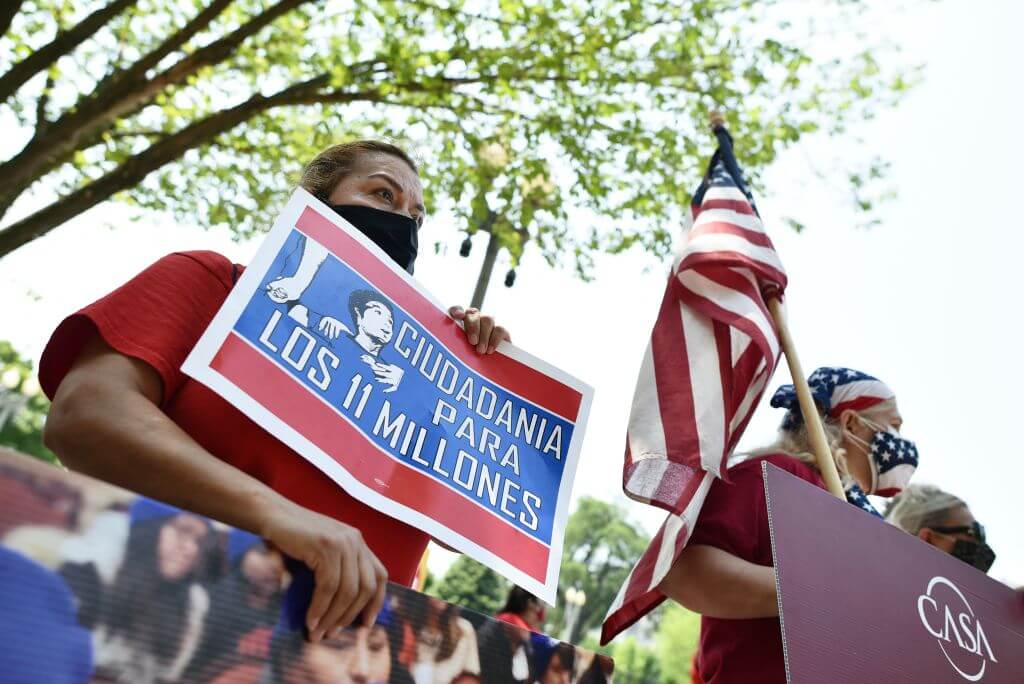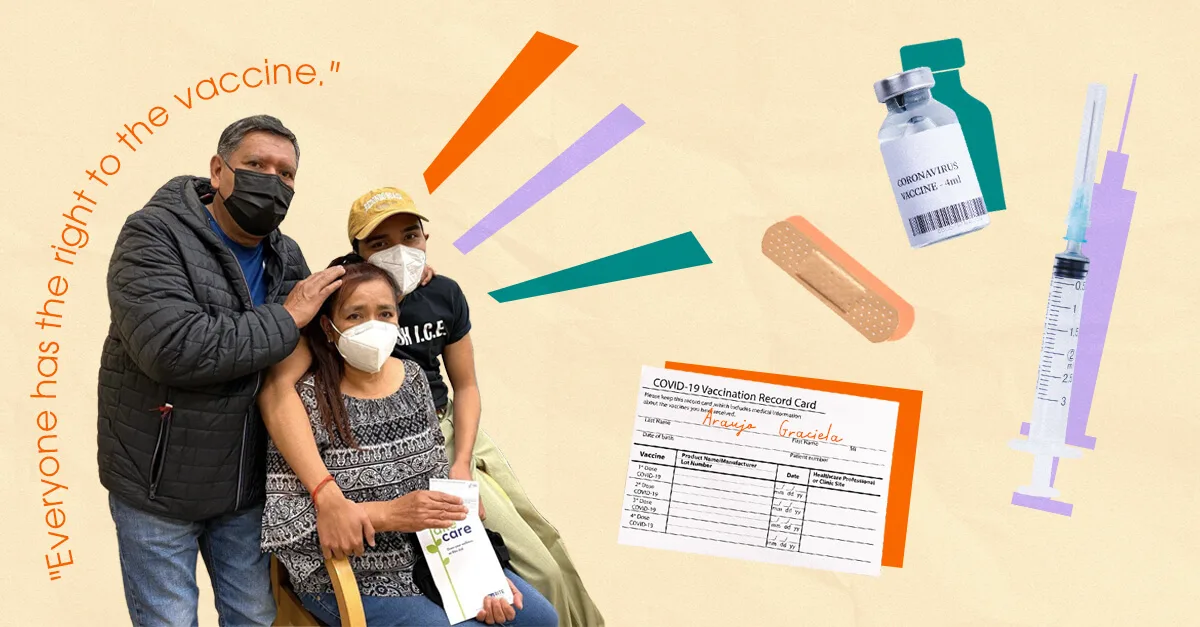
Image via AP Photo/Ashley Landis
The U.S. Citizenship and Immigration Services is slowly approving new citizenship applicants, but many more face delays which could have a serious effect on the voting outcome in the presidential election.
Since the coronavirus outbreak in the U.S., the immigration system got hit with several setbacks. Not only were borders around the world shut down, but immigration offices were also closed, which meant people attempting to finalize their citizenship faced delays. On top of all these impediments, the Trump administration also placed new restrictions against those seeking to become U.S. citizens. Now that the country is slowly getting back on its feet, the U.S. Citizenship and Immigration Services is sorting through a considerable backlog of applications. The issues, however, are far from over.
The U.S. Citizenship and Immigration Services says a budget crisis could force the agency to furlough nearly three-quarters of its workforce, severely curtailing operations as tens of thousands of people wait to become citizens. Even if the agency approves many new U.S. citizenship applicants, by, for example, conducting drive-thru ceremonies, many others won’t be able to get approved. Those delayed applicants will not be able to vote in the upcoming presidential election.
Related: 58% of Americans Support Voting By Mail. But Republicans Are Fighting the Idea.
That could have potential political consequences, especially in states such as Michigan and Florida, where the number of newly naturalized Americans already exceeds the narrow margin of victory for President Donald Trump in 2016.
“I wouldn’t be surprised if you have several hundred thousand people who are not in a position to vote in this election but would have been if business had been progressing normally at USCIS,” said Randy Capps of the Migration Policy Institute. “That’s been everyone’s concern.”
Most Americans are already anticipating issues during the presidential election as well. In a survey conducted by the Pew Research Center, two-thirds of Americans (67%) — including 80% of Democrats and Democratic-leaning independents and half of Republicans and Republican leaners — say it is very or somewhat likely that the coronavirus outbreak will significantly disrupt people’s ability to vote in the presidential election.
As far as immigration is concerned, the citizenship agency has not publicly explained how it will operate if it doesn’t get $1.2 billion in emergency funding from Congress before Aug. 3. It said in a written response to questions that “all USCIS operations will be impacted by a furlough” that covers more than 13,000 workers.
Related: Florida GOP’s Attempt to Stop 1.4 Million From Voting Ruled Unconstitutional
USCIS derives nearly all its $4.8 billion budget from fees it charges to people who apply to live or work in the country. Revenue was already in decline under Trump, whose administration has imposed a number of immigration restrictions. The agency says COVID-19 caused it to drop by half.
“The effects of the coronavirus pandemic are long-reaching and pervasive, leaving few unscathed in its wake,” Acting Director Joseph Edlow said.
In written responses to questions, the agency says it would pay back the money it receives from Congress with a 10% surcharge on fees.
While the agency cites the pandemic for its budget woes, immigration experts and a USCIS employee union say other factors include administration policies of devoting more resources to vetting applications and searching for fraud.
The administration has also halted a number of programs — including a recent freeze on H-1B visas for skilled workers — that provide an important source of revenue for USCIS.
Related: What’s Really In Trump’s Immigration Ban
“The agency has really moved away from its mission and become more of an enforcement agency that carries out the agenda of the Trump administration,” said Diego Iñiguez-Lopez, policy and campaigns manager for the National Partnership for New Americans, an immigrant advocacy organization.
USCIS typically swears in 15,000 new citizens per week. The agency said there were about 110,000 people waiting to take the oath when they shut down in-person operations in March because of the virus. It said it expects to work through the backlog by the end of July, thanks in part to ceremonies like the one held at the federal building in Detroit or similar ones outside a minor league baseball stadium in Des Moines, Iowa, and a community recreation center near San Diego. Some in Congress have pushed to allow virtual swearing-in ceremonies, but the agency has refused.
Behind those waiting for the ceremony is a long line of some 700,000 people who have submitted applications for naturalization, facing an average time to process that has risen to 10 months from six months in the last year of the Obama administration.
That backlog has a number of causes, including a surge in interest due to the election of a president who has made restricting immigration a centerpiece of his administration and the increased scrutiny of applications, said Capps, director of research for U.S. programs at the Migration Policy Institute.
Related: Will New Latino Voters Swing The Election?
Some, like Iris Lapipan, have had better luck. She’ll be voting this year as a U.S. citizen for the very first time. Lapipan, who came to the U.S. from the Philippines as a child in the 1990s, was among those naturalizing at a recreation center in El Cajon, California. She said she is looking forward to being able to travel outside the United States and participate in the election. She said she was leaning toward former Vice President Joe Biden. “I’m excited that I can vote, especially with what is going on now,” she said.
Rosenberger is leaning the other way, saying she is generally conservative and would most likely support Trump. “Now that I’m a citizen I’m very excited about voting,” she said. “You have the right now, so use it.”
The Associated Press contributed to this story.
Politics

Teamsters and UPS Reach Tentative Deal to Avoid Strike, 340,000 Workers to Get Raises
The tentative deal represents a huge win for full- and part-time UPS Teamster workers, who would get significant pay raises and better working...



One Republican Senator Is Blocking 265 Military Promotions, Leaving the Marines Without a Confirmed Leader
Sen. Tommy Tuberville's decision means these military officers are not getting the pay raises they’re owed, cannot move their families to wherever...
Local News



Teamsters and UPS Reach Tentative Deal to Avoid Strike, 340,000 Workers to Get Raises
The tentative deal represents a huge win for full- and part-time UPS Teamster workers, who would get significant pay raises and better working...



One Republican Senator Is Blocking 265 Military Promotions, Leaving the Marines Without a Confirmed Leader
Sen. Tommy Tuberville's decision means these military officers are not getting the pay raises they’re owed, cannot move their families to wherever...




